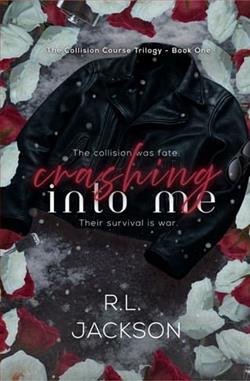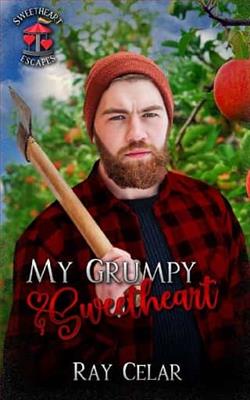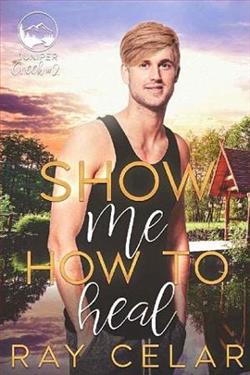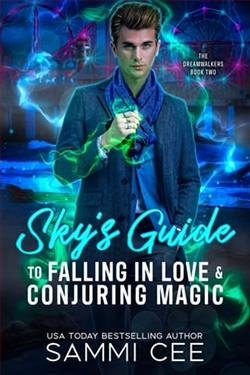Page 42 of Prince Material
“Orson.” Floris’s voice was impossibly gentle. “You were four years old. You didn’t need to be worthy. You were his son. That was enough.”
“But I have to make it mean something,” I whispered into his shoulder. “His death has to have a purpose.”
“It did.” Floris pulled back enough to look at me, his hands warm on my shoulders. “It meant you lived. You grew up. You became this amazing person who cares so deeply about helping others. That’s more than enough.”
I blinked hard against sudden tears. “I miss him. And I’m scared of losing anyone else. When Mom collapsed, all I could think was ‘not again.’”
“I know.” His voice was soft, understanding. “Is that why you push yourself so hard? Why you won’t let yourself have anything beyond your studies?”
The question hit too close to home. “I can’t afford distractions. If I mess up, if I make the wrong choice…”
“Then you learn from it and try again.” His hands moved to frame my face, forcing me to meet his eyes. “You’re allowed tolive, Orson. To make mistakes. To want things beyond honoring your father’s memory. But for what it’s worth, I think your dad would be proud of you. Not because you’re perfect, but because you’re you. Because you care so much about helping others that you’re willing to give up your own dreams to do it.”
I stiffened. “What do you mean?”
“I’ve seen how you light up when you talk about historical architecture and restoration. That’s your passion, not modern civil engineering.” He leaned forward slightly. “But you’re pushing yourself into a different path because you think that’s what you need to do to honor your dad’s sacrifice.”
“I… That’s not…” But the protest died in my throat because he was right. Of course he was right. “Civil engineering saves lives.”
“So does preserving historical buildings properly. Making sure they’re structurally sound while maintaining their character.” His voice was gentle but firm. “You don’t have to save lives the way he did or how you think you should. Sometimes, the best way to honor someone’s memory is to live authentically, to be true to who you are.”
I stared at him, this prince who somehow saw right through all my carefully constructed walls. “When did you get so wise?”
His smile was soft, real. “I’m full of surprises. Also, probably the sugar high from those beignets. They were seriously amazing.”
I laughed despite myself, and something in my chest loosened slightly. Leave it to Floris to lighten the mood with a joke.
“Want to see more of the Quarter?” I offered. “There’s this amazing historical house museum that shows the original Spanish colonial architecture…”
His face lit up. “Lead the way.”
As we walked through the familiar streets, Floris asked intelligent questions about the architecture, genuinely interested in the historical details I usually kept to myself. And if our shoulders brushed more often than strictly necessary, well, that was because of the crowded sidewalks.
The words he had spoken settled somewhere deep insideme, warm and healing. Maybe he was right. Maybe being alive, being me, was enough.
Maybe.
13
FLORIS
Orson’s bed was only marginally more comfortable than my creaky mattress in our dorm room, but it smelled like him, so I had still slept like a baby. Hell, I’d even slept in somewhat, not waking up till nine.
Thanksgiving preparations were already underway downstairs. I could hear Diana humming as she worked in the kitchen, the occasional clatter of pots and pans punctuating her melody. The sounds and smells wafting up were enough to make my stomach growl loud enough to qualify as its own musical accompaniment.
I’d offered to help the day before, but she’d shooed me away with a fond, “You’re our guest, honey.” Though I suspected it had more to do with protecting her kitchen from my questionable culinary skills than actual hospitality. Orson had probably warned her about the microwave incident and my general proneness to clumsiness. In my defense, how was I supposed to know that aluminum foil and microwaves were mortal enemies? That wasn’t covered in my royal education, though maybe itshould have been, right between “proper tea-sipping etiquette” and “how to wave without looking like you’re swatting flies.”
Now I stared at my reflection in the bathroom mirror, toothbrush hanging from my mouth as I tried to tame my increasingly wild curls. The New Orleans humidity was doing things to my hair that defied both gravity and common sense. At this rate, I’d need a royal decree to get it to lay flat. Maybe I could claim diplomatic immunity from bad hair days? Was that a thing? Note to self: consult with the Dutch ambassador about adding that to international treaties.
Not that it seemed to matter to Orson. Granted, his hair was even wilder than mine, but it only added to his charm. My mind drifted back to the previous day, to Orson standing in front of his old house, to the raw vulnerability in his voice as he shared his story. The weight he’d been carrying all these years, that desperate need to prove himself worthy of his father’s sacrifice, explained so much about him. His obsessive studying, his reluctance to take risks or allow himself any joy beyond academic achievement, his fanatical attention to detail.
My chest ached for how young he’d been, only four years old, watching his father disappear beneath the rising waters. No wonder he triple-checked everything, planned for every contingency, always wanted to be in control. He’d learned too early how quickly life could change, how one moment could alter everything.
And yet despite that trauma, or maybe because of it, he’d grown into someone incredible. He was brilliant and caring and so much stronger than he knew. The way his eyes had lit up when we’d toured that historical house museum afterwards, his whole face transformed as he explained the architectural details… That was the real Orson, the one he kept buried beneath duty and guilt.
I wanted to see more of that Orson. I wanted to be the one who helped him rediscover joy, who showed him he deserved happiness beyond honoring his father’s memory. The urge to kiss him had been almost overwhelming when he’d gotten excited about those original Spanish colonial features, his hands gesturing animatedly as he explained their historical significance.
But would telling him how I felt add more pressure? The last thing I wanted was to become another complication in his carefully ordered life. We had built a beautiful friendship, one that meant so much to me. Was I willing to risk all that?















